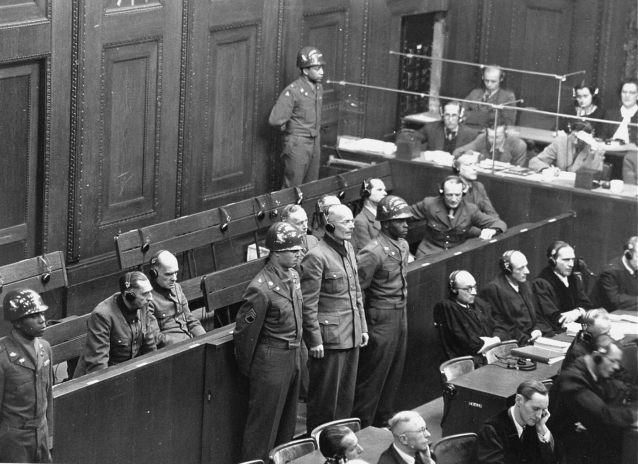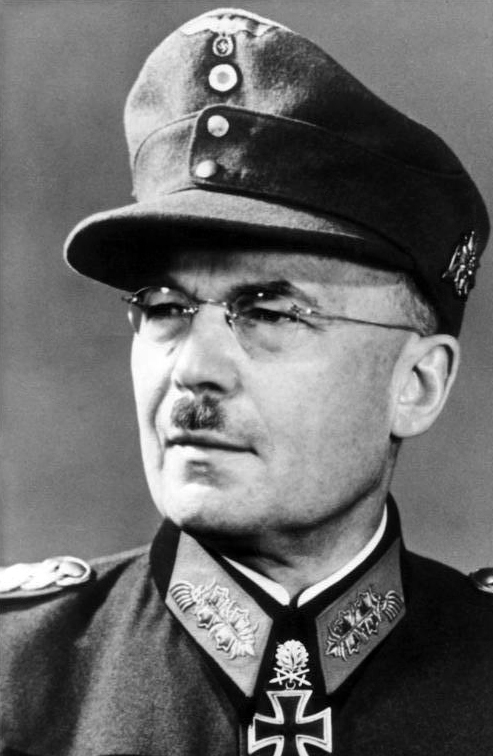Aftermath: The Nuremberg 'Hostage Trial' ruling on the scorched earth events in Finnmark
The Acquittal of Rendulic for the destruction of Finnmark
Despite the widespread destruction wrought through Operation Nordlicht the judges at Lothar Rendulic's trial at Nuremberg (the Hostages Trial) acquitted him of the charge of 'plunder and wanton destruction'. This is what the judgement says,
We are not called upon to determine whether urgent military necessity for the
devastation and destruction in the province of Finmark actually existed. We are concerned
with the question whether the defendant at the time of its occurrence acted within the limits
of honest judgment on the basis of the conditions prevailing at the time.
The course of a military operation by the enemy is loaded with uncertainties, such as the numerical strength
of the enemy, the quality of his equipment, his fighting spirit, the efficiency and daring of his
commanders, and the uncertainty of his intentions. These things when considered with his
own military situation provided the facts or want thereof which furnished the basis for the
defendant's decision to carry out the "scorched earth" policy in Finmark as a precautionary
measure against an attack by superior forces.
It is our considered opinion that the conditions, as they appeared to the defendant at the time were sufficient upon which he could honestly conclude that urgent military necessity warranted the
decision made. This
being true, the defendant may have erred in the exercise of his judgment but he was guilty of no criminal act. We find the defendant not guilty on this portion of the charge.
Point 23g (para 1298) - paragraph breaks added - see Nuremberg Judgement transcript at http://werle.rewi.hu-berlin.de/Hostage%20Case090901mit%20deckblatt.pdf

This basically says that we as judges cannot place ourselves in the shoes of the defendant and the context he faced at the time and the judgement he made of this. From this we believe Rendulic 'could honestly conclude that urgent military necessity warranted' the wholescale destruction of Finnmark. In this Rendulic may have been wrong but in so doing he did not commit a criminal act.
The Conviction of Rendulic for other war crimes
Rendulic was found guilty of the other three charges in the so-called Hostage Trial but these did not concern Norway or Finland. He was sentenced to 20 years imprisonment. The three charges were,
1. That defendants were principals or accessories to the murder of hundreds of thousands
of persons from the civilian populations of Greece, Yugoslavia, and Albania by troops of the
German armed forces;
3. That defendants were principals or accessories to the drafting, distribution, and execution
of illegal orders to the troops of the German armed forces which commanded that enemy
troops be refused quarters and be denied the status and rights of prisoners of war and
surrendered members of enemy forces be summarily executed;
4. That defendants were principals or accessories to the murder, torture, and systematic
terrorization, imprisonment in concentration camps, forced labor on military installations, and
deportation to slave labor of the civilian populations of Greece, Yugoslavia, and Albania by
troops of the German armed forces acting pursuant to the orders of the defendants;
(From Nuremberg Judgement transcript at http://werle.rewi.hu-berlin.de/Hostage%20Case090901mit%20deckblatt.pdf pp.1234-5 - first clause of each charge only).

The Sentence Rendulic received, its reduction and his early release
The trial began on 17th July 1947 and ended on 19th February 1948 (7 months duration). There were 12 defendants - one of whom committed suicide before the arraingment and one who was declared unfit to continue. The specifically Finnmark 'wanton destruction' charges only applied to Rendulic.
Questions have been raised over Rendulic's sentence.
It is difficult to explain why Rendulic was sentenced to 20 years instead of to life. He was higher-ranking than Kuntze and was, like List, convicted of both distributing illegal orders and failing to prevent illegal executions.29 The Hostage tribunal also did not find any mitigating factors for Rendulic, in contrast to List and Kuntze. The only reasonable inference is that the Tribunal did not feel a life sentence for Rendulic was warranted given that he was responsible for a much smaller area of occupied territory and fewer soldiers than either List or Kuntze.
(Heller, K., (2011) The Nuremberg Military Tribunals and the Origins of International Criminal Law, OUP, pp. 298 online).
Rendulic's sentence was reduced in 1949 to 10 years and and on 1 February 1951 Rendulic was released from the military prison in Landsberg am Lech in Bavaria (Wikipedia:
Rendulic). This recution and early release appears to have nothing to do with Rendulic's character but to 'the complete collapse of the U.S.‘s commitment to the NMT [Nuremberg Military
Tribunals] trials' (see below).
Peter Maguire has written that 1949 inaugurated a 'second phase' of U.S. war-crimes policy, one in which American and West German leaders fashioned two American policies 'one public and one private. The public policy was designed to defend the legal validity of the American trials from widespread German attack, while the private policy sought to release war criminals as quickly and quietly as the political and legal circumstances would allow.'
[The] ... 'private policy' led to what can only be described as the complete collapse of the U.S.‘s commitment to the NMT [Nuremberg Military Tribunals] trials. When those trials drew to a close in April 1949, many of the 142 convicted defendants were facing execution or significant prison sentences: 24 had been sentenced to death; 20 had been sentenced to life; and 18 had been sentenced to more than 20 years. A mere six years later, however, only 12 of the 25 death sentences had been carried out and only seven of the prisoners serving sentences of 20+ years remained in prison. Indeed, the last NMT defendant would walk out of Landsberg Prison a free man in 1958 (Heller, The Nuremberg Military Tribunals p. 311).
A judgement of the success of the Nuremberg Military Tribunals
In the conclusion to his book Heller says that the post-trial phase of the NMT programme in which retributive justice demands that those found guilty as well as standing trial and being convicted 'must also actually serve their sentences' was 'a complete failure'. (Heller, The Nuremberg Military Tribunals p. 374). This was due to a changed political context where U.S. war-crimes officials needed 'to release the convicted defendants was driven by the politics of the Cold War, not by legal considerations' (ibid p. 374).
The NMTs were hugely successful in some regards - in particular the documentation of the Nazi Regime and its crimes in meticulous details (130,000 pages of evidence) and the development of
international law. But the scorecard was much more mixed when it came to the education of a reluctant German public about crimes committed in its name. This task was made much harder by the early
release of war-crimes prisoners with no legal justification.
Controversy immediately after the trial
Interestingly, the day after the trail, the presiding judge of Tribunal V (which had heard the case), Judge Wennerstrum, a justice of the Iowa Supreme Court, condemned the Hostages trial as 'victor's justice' and accused the prosecution of failing ' to maintain objectivity aloof from vindictiveness, [and] aloof from personal ambitions for convictions'.This Nuremberg trial was 'held before an exclusively U.S. Military Court'.
This was picked up by major US newspapers and was one of the greater controversies of the Nuremberg trials (see Heller, K., (2011) The Nuremberg Military Tribunals and the Origins of International Criminal Law, OUP, pp. 97-8 online).
Wennerstrum said in 1948,
'The trials were to have convinced the Germans of the guilt of their leaders. They convinced the Germans merely that they lost the war to tough conquerors.' (NYTimes Obituary: Wennerstrum).
More detail on Wennerstrum's views of the trial suggest a more modulated judgement.
'Although Wennerstrum made it clear that he believed that the defendants had received just punishment, that there was adequate international law upon which to base the judgments, and that the war crimes trials should continue in spite of their shortcomings, he also made some rather negative statements about his war crimes trial experiences. His main concern was that "the victor is never an unbiased judge of war crime guilt. A neutral, third party should have held the trials" [rather than a U.S. Military Court] (The Biographical Dictionary of Iowa).
Whatever the reasons for his outburst (some say he was 'conned' by a U.S. journalist) the day after a seven month trial at which he was the presiding judge Wennerstrum was attacked the day after in public by General Telford Taylor, the chief U.S. prosecutor through an open letter to Wennerstrum which ended,
"Instead of making any constructive moves while you were here, you have chosen to give out a baseless, malicious attack during the last hours of your eight months stay and then leave town rather than confront those whom you have so outrageously slandered. I would use stronger language if it did not appear that your behavior arises out a warped, psychopathic mental attitude." (The Biographical Dictionary of Iowa).
Aftermath II
Finnmark is the only county of a NATO member that has a border with Russia. Its proximity to areas of sensitive Russian military activity (nuclear-armed subs and atomic test areas) has made it a
key Cold and post-Cold War location. Controversy has raged over the siting of the sophisticated Globus II radar at Vardø - (see this interesting Wall Street Journal article from 2000).
Tensions are rising once again the region with Putin's increasingly aggressive stance towards the West. An ex-Norwegian artillery soldier in a personal communication said, 'Russian modern air
fighters close to our border - sometimes on their way to your border. More scary than interesting.'
